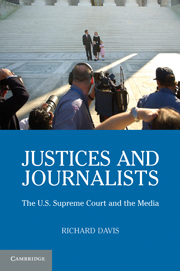Foreword by Adam Liptak
Published online by Cambridge University Press: 05 June 2012
Summary
In the late summer of 2010, Justice Stephen Breyer embarked on an extraordinary publicity tour.
He had just published a book called Making Our Democracy Work: A Judge's View, which was earnest and dry and worthy. It would have vanished without a trace had its author not sat on the Supreme Court.
Thus it was Justice Breyer's status, rather than his message, that propelled him onto the airwaves. Over a month or so, he appeared on CNN's Larry King Live, on PBS's Newshour and Charlie Rose, on NPR's Fresh Air and Morning Edition, on ABC's Good Morning America, on the NBC Nightly News, and on C-SPAN.
Justice Breyer was also profiled in The New Yorker and interviewed by, among others, the Associated Press, Bloomberg News, and The Washington Post.
And he appeared at countless discussions sponsored by the Aspen Institute, the National Constitution Center, book stores, law schools, libraries, and civic groups from coast to coast.
In many of these forums, there was the usual tension between journalist and subject, with the former pressing provocatively for fresh and newsworthy comments and the latter seeking to convey an array of stock talking points.
For the most part, Justice Breyer stuck to his main themes, and even a connoisseur of Supreme Court interviews would have difficulty distinguishing what he told, say, Charlie Rose from what he told Larry King.
- Type
- Chapter
- Information
- Justices and JournalistsThe U.S. Supreme Court and the Media, pp. ix - xiiPublisher: Cambridge University PressPrint publication year: 2011
- 3
- Cited by

